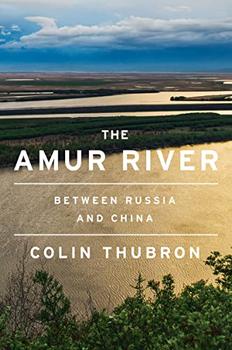Summary | Excerpt | Reviews | Beyond the Book | Readalikes | Genres & Themes | Author Bio

Between Russia and China
by Colin Thubron
But by noon we are mired in another terrain. Our track thins to a horse's width, and is almost lost among birch scrub, and we are brushing blindly through it. For hours we hear only the sloshing plod of our horses. Then we are plunging into steep-banked streams, tributaries to rivers we do not know, with the packhorses following. Sometimes we dismount and lead them. We sink in shin-deep. My waterproof trainers are useless, and the boots of the others filling with water.
The horses are not used to this. They are the heirs of nomad cavalry, bred for the steppes. Riding them, you forget anything you've been taught. I no longer rein in the White Horse when he nuzzles the buttocks of the packhorse in front. And you spur them forward not with your heels but with a hissing Chu-chuh. You never fondle their heads. As we reach higher ground we start to go faster, with relief. But the preferred gait of the White Horse is not a leisurely canter but a fast trot. For mile after mile he insists on this jarring bustle for which the Western rider's inured rise-and-fall in the saddle is hopeless – the tempo is too fast – and instead you stand in your stirrups as the Mongol raiders did.
It is after one of these furious trots that we stop and throw ourselves down in the grass. I remember its softness and the weight of my breathing. A few minutes later, standing up and suddenly dizzy, I recover consciousness at the foot of the White Horse, with my ankle twisted under me. With misgiving I feel its creeping pain. Then Batmonkh helps me into the saddle. For a moment I wonder if I've fallen because of altitude – but we are only at 6,700 feet. Wilfully I decide the ankle can't be broken, and that in the morning I'll be walking. Then I feel the ease of being on horse again, my foot weightless in the stirrup, and the valleys opening before us in a shining sea of green. And with this a chill descends: the cold wonder of travelling a land empty of the memory or scars of human history. Sometimes russet crags break through the forested mountain tops with the semblance of man-made walls and forts, but this is illusion. Human tracks peter out, and the only flight path across the sky is the passage of vultures.
Yet even here this void is not complete. The poaching that broke out in the chaotic years after the Soviet Union's collapse has abated, but not gone, and Russian hunters still occasionally cross the border to feed the Chinese market in traditional medicines by slaughtering musk deer and bears. Yet my companions vouch that wildlife is returning, and for days the only trespasser we meet is an old man in rags gathering pine nuts.
Here the shadows of the past are older, deeper. For this is the Mongol heartland. Eight hundred years ago Genghis Khan decreed the upper valleys of the Onon and Kherlen rivers an inviolable sanctuary, permitted only to Mongol royalty, sealed off for their private rites and burial. It became the spiritual powerhouse of his vast empire. Even now, Batmonkh says, travellers to these mountains are resented. This is holy land. Somewhere to our east, a forested massif lifts to the rocky pate of Khan Khenti, revered as Burkhan Khaldun, on whose slopes the young Genghis Khan, destitute and alone, found a haven from his tribal enemies. On these protective heights, runs the Mongol epic, he sheltered as poor as a grasshopper, and later faced the mountain in grateful worship – a mountain already sacred to his people, close to the Eternal Blue Sky of their ancestral veneration. To this mountain, too, he dedicated the worship of his descendants for ever, and himself returned in times of crisis to breathe again its primal power.
The true site of Burkhan Khaldun is unsure, but beyond us, in the watershed of the Onon, its valley fills with the adversities of the future conqueror. Here, in about 1162, he was born into the clan of a minor chief. On its banks, after his people had abandoned her, his mother dug for roots to keep her children alive, while the boys fished its streams; and here, after escaping from imprisonment by enemy raiders, Genghis submerged himself in the Onon waters, keeping his head afloat in the wooden halter by which they had confined him, then slipped away.
Excerpted from The Amur River by Colin Thubron. Copyright © 2021 by Colin Thubron. Excerpted by permission of Harper. All rights reserved. No part of this excerpt may be reproduced or reprinted without permission in writing from the publisher.




Music is the pleasure the human mind experiences from counting without being aware that it is counting
Click Here to find out who said this, as well as discovering other famous literary quotes!
Your guide toexceptional books
BookBrowse seeks out and recommends the best in contemporary fiction and nonfiction—books that not only engage and entertain but also deepen our understanding of ourselves and the world around us.